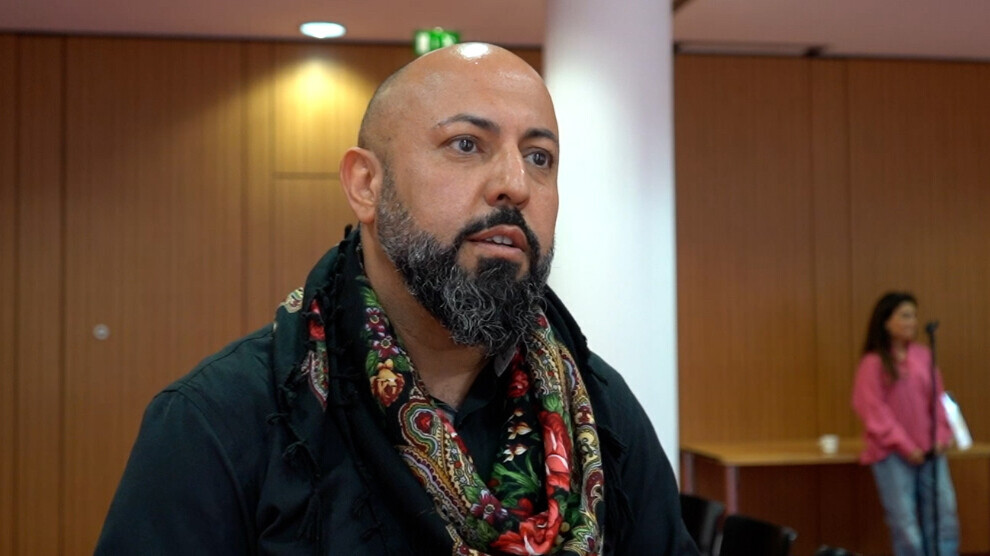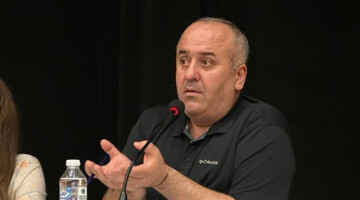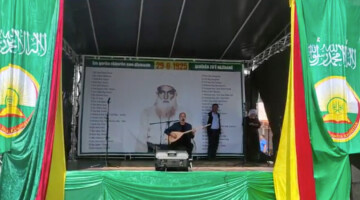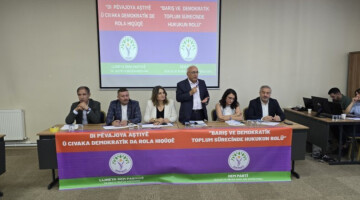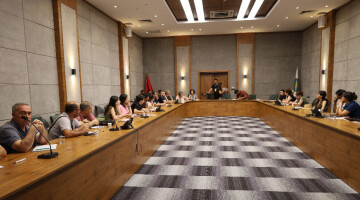The most important decision of the PKK's (Kurdistan Workers' Party) 12th Extraordinary Congress, announced on May 12, was to dissolve the organization and end armed struggle. The German Foreign Ministry stated that it viewed this decision as a positive step for the peace process in Turkey. However, no steps have yet been taken regarding the ban on the PKK, which has been in place in Germany since 1993. This ban is used to criminalize Kurds; Kurdish civil society organizations are subjected to police pressure, and meetings and demonstrations are met with police attacks.
Most recently, Yüksel Koç, former co-chair of KCDK-E (Congress of Kurdistan Democratic Communities in Europe), was imprisoned in Bremen on May 21 on charges of “membership of a terrorist organization.” Yüksel Koç has long been one of the most prominent figures in Kurdish politics in Germany and across Europe. His detention at a time when peace talks are ongoing in Turkey has raised questions.
PKK ban in Germany in place since 1993
On 22 November 1993, the then Minister of the Interior, Manfred Kanther, imposed a ban on the activities of the PKK (Kurdistan Workers’ Party) in Germany. This was followed by bans on numerous organisations and media that were accused of being part of the PKK structure. The PKK has been listed as a terrorist organisation by the EU since 2002. Since then, hundreds of Kurdish activists have been charged with violating these bans and with violating Sections 129a and 129b of the German Criminal Code, and some have been sentenced to long prison terms.
Lawyers applied to the German government on May 11, 2022 to lift the PKK ban. The government's response was reported to be negative. While the government rejected the application on the grounds that it would “affect Germany's foreign policy interests and, in particular, jeopardize relations with Turkey,”, the PKK filed a lawsuit against the Federal Republic of Germany before the competent administrative court earlier this month.
Koçak: Lifting the ban will be a first step
Speaking to ANF, member of the German Parliament Ferat Koçak of Die Linke called on the German government to reconsider its ban on the PKK in Germany after the PKK's decision to officially end its armed struggle and disband. Koçak stated that lifting the ban will be “a first and necessary step” if the German government is serious about its announced support for a new peace process in Turkey.
“When the federal government talks about peace, it must also draw the appropriate political conclusions,” said Koçak. He said his parliamentary group would raise the issue again in the Bundestag and submit relevant parliamentary questions.
The Left Party has been calling for a more nuanced assessment of the PKK for years. Critics of the ban argue that it leads to the criminalization of Kurdish cultural associations and political activity. According to Koçak, events and demonstrations organized by Kurdish organizations are regularly restricted or broken up by police operations.
The role of Germany
Known for its historically deep ties with Turkey and the Ottoman Empire, Germany has assumed international responsibility for the suppression of the Kurdish freedom movement after the PKK's armed struggle began on 15 August 1984. This role has been taken on the one hand because of the Kurdish population living in their country, and, on the other hand, because of its important role within NATO during the Cold War.
The concept of NATO for the suppression of freedom movements was used against the PKK in late 1984 and early 1985. The aim was to break international support for the resistance that had begun in Kurdistan. Important pillars of this concept were the operations against the PKK in the 1980s, not only in Germany but also in a large number of European countries, as well as strong military support for the Turkish state.
At the beginning of the 1990s, Helmut Kohl's government was looking for new methods, given that the number of Kurdish population in Germany was rising due to the migration wave. In order to stifle the Kurdish freedom movement internationally and to severe the Kurds who came to Germany from the resistance, all activities of the PKK were banned. On 26 November 1993, the prohibition was issued.
In the 53-page letter prepared by the then Minister of the Interior, Manfred Kanther, the rallies of the Kurds - with the aim of publicizing the events in Kurdistan - were criminalized, while nothing was said about the crimes of the Turkish state in Kurdistan. On the day of the PKK ban, the news agency KURD-HA, the magazine Berxwedan, the Federation FEYKA-Kurdistan and exactly 30 associations and information centers were closed with the same decision and the corresponding publications ceased. However, despite repression and violence, Kurdish society stood behind their institutions.
A short time later, new institutions were opened. Up to 70 associations rank in the nationwide Kurdish organization YEK-KOM (Federation of Kurdish Associations in Germany).
Against the strong organization of the Kurdish freedom movement, new concepts and prohibitions were introduced in each phase. In 2010, the PKK was included in the list of "foreign terrorist organizations" by the Federal Constitutional Court. With this decision, the proceedings against Kurds were set to be even easier and could be opened without any evidence or justification.
With the legal arrangement known as "129b act” investigations were initiated against dozens of Kurdish politicians. Bedrettin Kavak, Mehmet Demir, Mustafa Çelik, Kenan Baştu, Ali Özel, Ahmet Çelik, Ali Hıdır Doğan, Zeki Eroğlu and Muhlis Kaya are just some of those sentenced to between two and three and a half years in prison.
Increase in repression with the 2018 notice
The violence perpetrated by the German police against Kurdish demonstrators, which is not less than that in the 1990s, is also noteworty. The intolerance of the German police against demonstrations with pictures of the Kurdish leader Abdullah Öcalan and flags of the PYD, YPG and YPJ continues. A circular letter from the German Ministry of the Interior to the federal states on 2 March 2017 called for a ban on a large number of Kurdish political parties and institutions such as the PYD, YPG and YPJ.
On January 29, 2018, a new circular of the Ministry of Interior was published. The six-page letter, whose style is similar to that of AKP officials, calls for a stricter implementation of the PKK ban in the states of Germany. This circular prohibits all PKK-related symbols, writings and slogans. The banishment of Abdullah Öcalan from the public perception is expressly formulated. According to this circular, the operations of the political annihilation campaign against Kurds in Germany picked up speed.
Rallies in solidarity with the resistance in Afrin and against the crimes of the Turkish state were banned. This procedure was and is not compliant with the promised German rule of law. One of those who sharply criticized this lawlessness against the Kurds was Gerhart Baum, the former Federal Minister of the Interior (1978-1982). The FDP politician criticized the Circular of the Interior Ministry of January 29, 2018, which allows a ban on meetings when there is a suspicion of PKK propaganda: "These are overzealous over-interpretations of the PKK ban. If one means to forbid the unification of the Syrian Kurds, then one would be consistent. But you cannot do this, because there is no reason to do so. Then you cannot punish people who use this symbol. (...) That goes too far. We have a broad, very far-reaching right to demonstrate in Germany. Even if a demonstration is to be feared, it must be approved. (...) To say from the beginning, we assume that the ban is disregarded, that will not work. That's unconstitutional."

